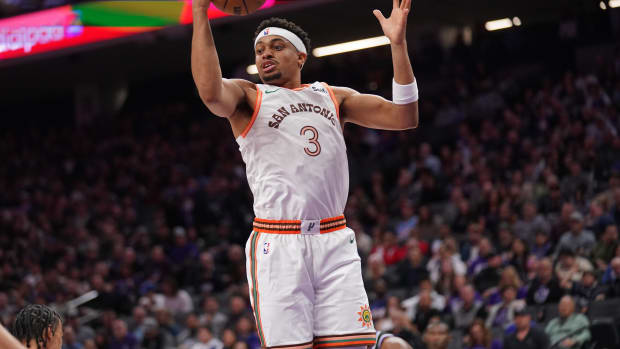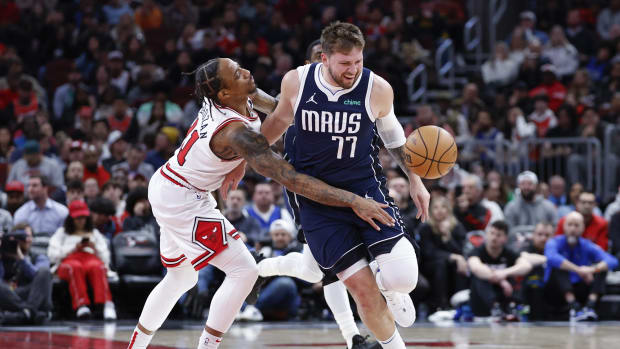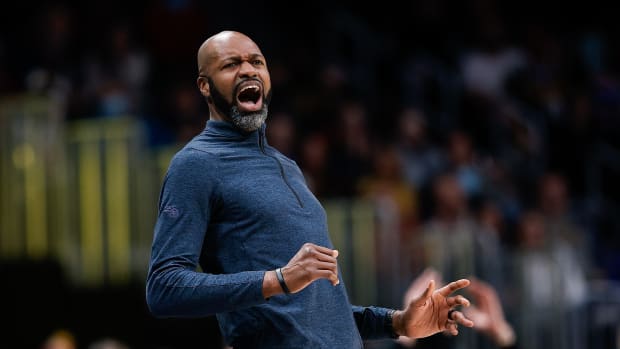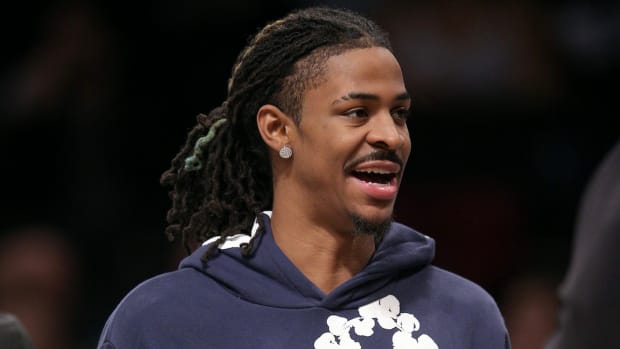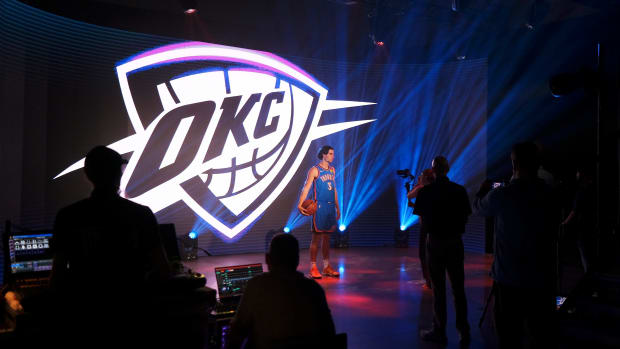Five questions surrounding Kevin Durant's season-ending foot surgery
Just when Kevin Durant thought his nightmare 2014-15 season couldn't get any worse, the Thunder announced Friday that the reigning MVP will undergo surgery on his right foot for the third time since October.
The news mercifully rules out Durant for the remainder of Oklahoma City's season, but the wait is really just beginning. The Thunder noted that Durant will undergo bone graft surgery in New York City next week and will be sidelined from basketball activities for 4-6 months, placing his expected clearance date sometime between late-July and late-September.
Let's take a crack at answering five key questions surrounding Durant's latest setback.
1. Why does Kevin Durant need another surgery?
Thunder GM Sam Presti appeared to take great pains to explain Durant's situation in a lengthy statement. To quickly recap the backstory: Durant initially suffered a Jones fracture in his right foot in October. He underwent surgery and missed a month, returning on Dec. 2. Durant played sporadically until just after the All-Star break in mid-February. He missed time in December with a right ankle injury, only to experience continued soreness in his foot, which led to a second surgery in February.The hope at that time was that Durant would be able to return this season, but things didn't play out as planned due to another bout of soreness, causing Durant to cease all basketball activities and Presti to suggest last week that Durant's season could be over.
[daily_cut.NBA] Foot injuries are notoriously tricky, and Presti's statement Friday suggested complications related to his initial fracture. "The evaluation process also determined that the Jones fracture of the fifth metatarsal, which had shown significant healing previously, was now demonstrating signs of regression," the statement read. According to Presti, 5-8 percent of Jones fracture surgeries wind up leading to setbacks at some point during the rehabilitation process, and a bone graft is the "standard procedure" for addressing such situations. "While everyone is disappointed that Kevin falls into that group, we are encouraged that the bone graft procedure has historically demonstrated long-term health and stability," the statement continued.
Although Durant was on a minutes restriction upon his initial return, many observers, especially frustrated Thunder fans, will wonder whether he returned too quickly. For what it's worth, the Thunder initially said that Durant would be reevaluated in six weeks after his first surgery, and he returned to the court in just under seven. It should also be noted that Durant was healthy enough to average 25.4 points, 6.6 rebounds and 4.1 assists in 27 games this year. He helped the Thunder to an 18-9 record with him in the lineup and he topped 40 points twice, even if he never consistently achieved his MVP form.
• MORE NBA: Dwight Howard making the 'ultimate sacrifice' | Open Floor
The lingering, and unanswerable, question is whether a slower approach during the initial recovery period could have helped Durant avoid some of these later setbacks. That ship has sailed, and for Durant the focus now must be on his next rehabilitation program rather than the last one.
2. What does this mean for the Thunder's season?
As noted earlier this week, the Thunder are firmly in the driver's seat for the West's No. 8 seed despite injuries to Durant and Serge Ibaka (knee), among others. Entering Friday's action, Oklahoma City trailed No. 7 Dallas by four games and led No. 9 Phoenix by three games with 11 games remaining on its schedule. Barring an unforeseen collapse, Russell Westbrook's torrid spring will produce a first-round matchup with league-leading Golden State.
Warriors: From one-dimensional and one-and-done to NBA title favorites
Even though Westbrook has been stacking up triple doubles like Jenga blocks, it would be downright shocking if the limping Thunder found a way to upset the steady, dominant Warriors. Consider: Golden State will have homecourt advantage and it possesses the league's best home record (34-2). What's more, Golden State's league-best home point differential of +15.7 far surpasses everyone else (the Clippers are second at +8.4). The Warriors are liable to blow out the competition on any given night at Oracle, and coach Steve Kerr's deep, versatile and high-IQ group will be looking to answer questions about its lack of postseason success right out of the gate.
Oklahoma City's downfall will almost certainly be its defense. In March, the Thunder have the league's second-worst defense (109.4 rating) and that dreadful number slips to 111.1 defensive rating when Ibaka isn't on the floor. That spells big trouble, with a capital "BIG," given that the Warriors' offense ranks first in the NBA. You can hear the Splash Brothers licking their lips already.
3. What's next for Durant?
How quickly things can do a 180-degree flip. Last summer, Durant chose to withdraw from USA Basketball's FIBA World Cup roster to give his body and mind some rest. He nevertheless trained relentlessly, as captured in an HBO documentary, running up hills with Westbrook, playing in endless pick-up and exhibition games and even taking in some subtle pointers from Steve Nash. This summer? Durant won't get the freedom to choose, instead dedicating himself to what will be the longest recovery period of his career.
In a worst-case scenario, Durant will be sidelined from late-February through late-September, meaning he will go seven months without the full-speed competition he has sought out around the calendar for years. The good news? Durant's current timetable easily puts him on track to return for the beginning of training camp, ensuring that he should have enough time to get fully right without needing to play catchup next year.
[pagebreak]
4. How will this injury change perception of Durant?
Entering this season, Durant had lived just about as charmed an NBA life as you can lead without winning a title. He has enjoyed remarkable health, played for a perennial contender and made multiple playoff runs, was the league's consensus top scorer and its second-best player. He was surrounded by talent on the court, played for a coach he respects, worked for a savvy GM and was beloved by a loyal fan base. None of those conditions necessarily changes because of Durant's foot problems, but all that winning and all that positivity can no longer be taken for granted.
James Harden, the NBA's unlikely MVP
Durant's consistency has always been one of his best attributes, and it's no coincidence that the infamous "Mr. Unreliable" headline caused such a stir. As a person and as a player, Durant was as reliable as it gets through his first seven seasons. This year, and going forward, his ability to make a night-to-night impact is dependent not only on his willpower and love for the game, but also on the cooperation from a surgically repaired foot.
After climbing almost all the way to the NBA's summit once—the only thing he didn't do was scale Mt. LeBron—Durant will enter next season needing to reestablish his position for the first time in years. A host of new names have entered the mix for the "best player not named LeBron James" conversation, including Anthony Davis, Stephen Curry and Westbrook, and surely the idea that others are passing him by is infuriating to the uber-competitive Durant.
More immediately, the injury robbed Durant, 26, a year of his prime and a solid shot at winning a title this year with James's move from Miami to Cleveland cracking open the window for everybody else. Checking off the championship box would have gone a long way toward reducing the pressure Durant is sure to face as a highly coveted member of the 2016 free-agency class. Instead, he remains stuck in the ring-less mud until next season.
• MORE NBA: Lee Jenkins profiles Durant and his mean streak (4.29.13)
The worst part about repetitive injuries, though, is they have the potential to totally reshape a player's career arc. Any basketball lover with a working heart is hoping this season is merely a bump in the road for Durant, rather than the beginning of an ongoing war with his body. Perhaps Westbrook's MVP-caliber bounce-back from three knee surgeries last year can serve as inspiration and cause for hope.
5. Will these ongoing foot injuries impact Durant's free agency in 2016?
The right answer, which most people don't want to hear, is the time to start digging into 2016 free agency is the day after the 2016 Finals.
Durant is a local icon in Oklahoma City and has said precious little about his long-term plans, although speculation and rumors have linked him to the likes of Washington (his childhood home) and Brooklyn (the big-market home of his agency, Roc Nation Sports). Presti, for his part, uncharacteristically pushed back hard when it was suggested the Thunder might preemptively trade Durant if they felt he might leave in free agency.
"It’s ludicrous to assert that we would trade Kevin," Presti told The Oklahoman. "There’s no way to measure what he represents to our organization on and off the floor. He has helped build this organization from the ground up and personifies the Thunder: past, present and future. When he’s done playing there will be streets named after him throughout the state and younger generations of Oklahomans will learn about the role Kevin has played in elevating this community in ways beyond basketball."
So far, the biggest tangible byproduct of Durant's injury issues has been the elevation of Westbrook's game in his absence. The four-time All-Star point guard is averaging a league-leading 27.3 points, 8.7 assists and 7.1 rebounds—all career-highs—while showing significant progress as a distributor. Westbrook has been the focal point of an efficient, lethal offensive attack since the All-Star break, and Durant will return next season with the knowledge that Oklahoma City's All-Star tandem has the potential to be better than ever before.
• MORE NBA: While You Weren't Watching | Fundamentals | All-Lifeline Team
This cuts both ways, in the modern NBA, as the more these two improve, the harder outsiders will look for potential cracks in their partnership. Durant has been directly critical of the media this season, and he would do well to realize that he ain't seen nothing yet. Until Durant publicly commits to his next team, whether that's the Thunder or someone else, he will be at the center of a free-agency storm that is likely to surpass Dwight Howard's, Chris Paul's and everyone else besides James's 2010 and 2014 earth-shakers. Trying to manage those obligations, protect himself and his teammates from that scrutiny and, you know, win basketball games will only be that much harder after coming off an injury.































